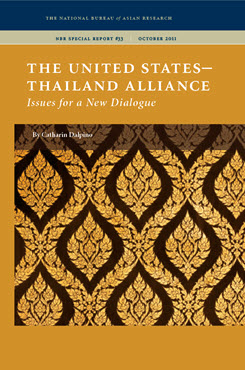NBR Special Report no. 33
The United States-Thailand Alliance
Issues for a New Dialogue
This essay assesses the history and evolution of the U.S.‑Thailand alliance, compares it to other U.S. security alliances in Asia, and explores the challenges they all face.
EXECUTIVE SUMMARY
MAIN ARGUMENT
Often hailed as the “oldest treaty ally of the U.S. in Asia” by virtue of the Treaty of Amity and Cooperation signed in 1833, Thailand has been a steady and enduring partner of the U.S. in Southeast Asia. The advent of the Cold War and U.S. engagement in the region brought security to the forefront of relations and cemented the two countries as formal allies, a relationship that has served both countries well and continues today. Despite a strong history, however, the alliance is arguably in a state of drift as the security environment in Asia evolves, states in Southeast Asia increasingly integrate, China rises, and traditional Cold War threats recede. These factors, among others, call for a new dialogue that can propel the U.S.‑Thailand alliance into the 21st century.
POLICY IMPLICATIONS
As the U.S. and Thailand seek to move the alliance forward, a number of issues have emerged:
- The nature of the alliance. Differences have emerged over whether the relationship is broad‑based or primarily a security arrangement. Clarity on this issue is important for public perception, as the rationale for the alliance is less apparent now than during the Cold War.
- The significance of a treaty alliance with the U.S. in the 21st century. Non‑ally countries increasingly receive the benefits of U.S. security cooperation without alliance responsibilities, raising questions about the relevance of formal alliances today.
- The changing regional threat environment. Changing regional dynamics and the absence of a Cold War–style threat environment have enabled Thailand to balance its relations with regional and global powers, raising key considerations for the U.S. as it assesses its security posture in the region.
- Thailand’s role in the region. The same geopolitical factors that make Thailand a desirable ally for the U.S. suggest that Bangkok could play a larger role in the region, particularly in regard to nontraditional security threats.


